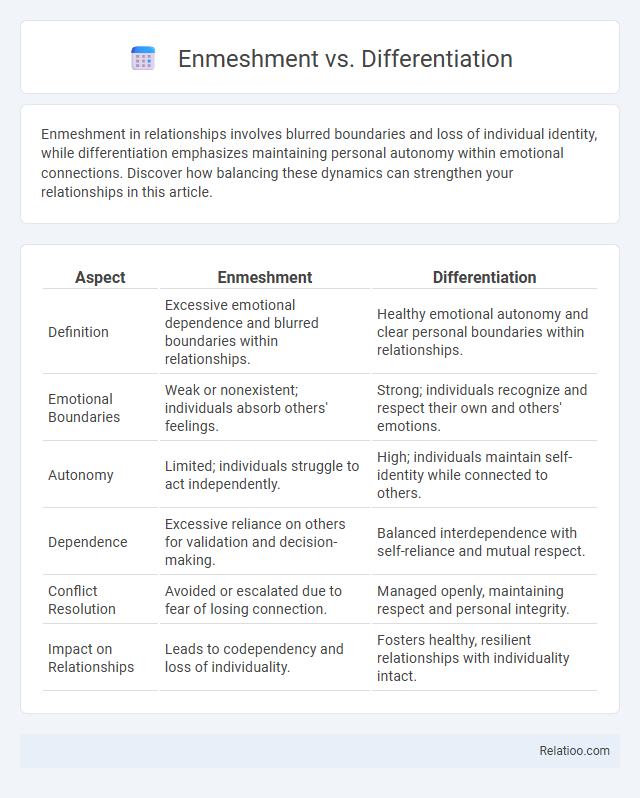Enmeshment in relationships involves blurred boundaries and loss of individual identity, while differentiation emphasizes maintaining personal autonomy within emotional connections. Discover how balancing these dynamics can strengthen your relationships in this article.
Table of Comparison
| Aspect | Enmeshment | Differentiation |
|---|---|---|
| Definition | Excessive emotional dependence and blurred boundaries within relationships. | Healthy emotional autonomy and clear personal boundaries within relationships. |
| Emotional Boundaries | Weak or nonexistent; individuals absorb others' feelings. | Strong; individuals recognize and respect their own and others' emotions. |
| Autonomy | Limited; individuals struggle to act independently. | High; individuals maintain self-identity while connected to others. |
| Dependence | Excessive reliance on others for validation and decision-making. | Balanced interdependence with self-reliance and mutual respect. |
| Conflict Resolution | Avoided or escalated due to fear of losing connection. | Managed openly, maintaining respect and personal integrity. |
| Impact on Relationships | Leads to codependency and loss of individuality. | Fosters healthy, resilient relationships with individuality intact. |
Understanding Enmeshment: Definition and Signs
Enmeshment occurs when personal boundaries between family members are blurred, leading to excessive emotional involvement and lack of autonomy. You may notice signs such as difficulty making independent decisions, feeling overly responsible for others' emotions, and a pervasive sense of guilt when asserting personal needs. Differentiation contrasts enmeshment by promoting healthy emotional separation, allowing individuals to maintain intimacy while preserving their own identity.
What Is Differentiation? Key Concepts Explained
Differentiation is the ability to maintain your sense of self while staying emotionally connected to others, allowing you to balance intimacy and independence effectively. It involves recognizing and expressing your own thoughts and feelings without being overwhelmed by others' emotions or conforming to external pressures. Developing strong differentiation helps improve your emotional resilience and supports healthier, more authentic relationships.
Origins of Enmeshment in Family Systems
Enmeshment originates in family systems characterized by blurred boundaries where individual autonomy is sacrificed for excessive emotional closeness, often stemming from caregivers' unmet needs or anxiety about separation. This dynamic contrasts with differentiation, which promotes healthy emotional separation and self-identity within family relationships, allowing members to maintain individuality while connected. Research in family therapy highlights that enmeshment results from inadequate boundary-setting during childhood, leading to dependency patterns and challenges in establishing personal autonomy in adulthood.
The Psychological Impact of Enmeshment
Enmeshment in relationships leads to blurred personal boundaries, causing individuals to struggle with self-identity and autonomy, which heightens anxiety and dependency issues. Differentiation fosters emotional independence and resilience by helping individuals maintain their sense of self while engaging in close relationships. The psychological impact of enmeshment includes difficulties in decision-making, low self-esteem, and impaired emotional regulation, contrasting with the healthier outcomes associated with strong differentiation.
Differentiation: Benefits for Personal Growth
Differentiation fosters personal growth by enabling individuals to maintain their sense of self while staying emotionally connected in relationships, promoting healthier boundaries and self-awareness. This psychological skill enhances decision-making and resilience by reducing emotional reactivity and increasing autonomy. Research in family systems theory highlights differentiation as crucial for emotional maturity, better stress management, and improved interpersonal dynamics.
Enmeshment vs Differentiation: Core Differences
Enmeshment refers to blurred boundaries in relationships where individuals lack autonomy and personal identity, often resulting in excessive emotional closeness and dependency. Differentiation involves maintaining a clear sense of self while remaining emotionally connected to others, allowing healthy boundaries and independent decision-making. The core difference lies in autonomy: enmeshment diminishes individuality, whereas differentiation supports balanced interdependence and personal growth.
How Enmeshment Affects Relationships
Enmeshment in relationships blurs personal boundaries, leading to excessive emotional involvement and dependence, which can stifle individual growth and autonomy. This lack of healthy differentiation makes it difficult for partners to maintain their separate identities, often resulting in conflict, resentment, and codependency. Developing clear differentiation helps establish emotional independence while fostering intimacy, ultimately promoting healthier, more balanced connections.
Steps to Achieve Healthy Differentiation
Healthy differentiation requires recognizing your own thoughts and emotions while maintaining connections with others, allowing for authentic self-expression without losing relational bonds. Establishing clear personal boundaries, practicing emotional regulation, and fostering open communication help reduce enmeshment and promote individuality within relationships. Consistent self-reflection and seeking supportive environments further enhance your ability to balance intimacy and autonomy effectively.
Overcoming Enmeshment: Practical Strategies
Overcoming enmeshment involves establishing healthy boundaries to promote individual autonomy and emotional independence within relationships. Implementing clear communication, fostering self-awareness, and seeking therapeutic support can facilitate differentiation, helping individuals maintain their identity while remaining connected. Consistent practice of these strategies reduces enmeshment's impact, leading to balanced, interdependent relationships.
When to Seek Help: Therapy for Enmeshment and Differentiation
When your relationships feel overly entangled or blurred, causing a loss of personal boundaries, seeking therapy for enmeshment can help restore your individuality and improve emotional health. Differentiation therapy focuses on helping you develop a strong sense of self while maintaining connectedness with others, enhancing your ability to manage emotional independence. If you experience persistent anxiety, identity confusion, or difficulty in setting limits, professional support is essential to navigate these relational dynamics effectively.

Infographic: Enmeshment vs Differentiation
 relatioo.com
relatioo.com